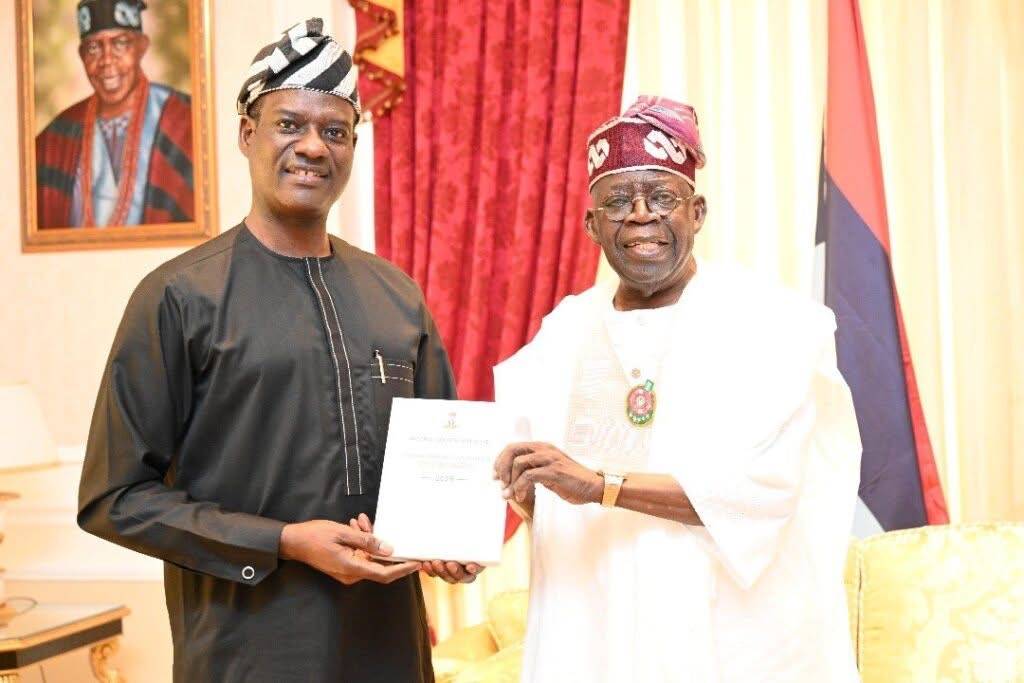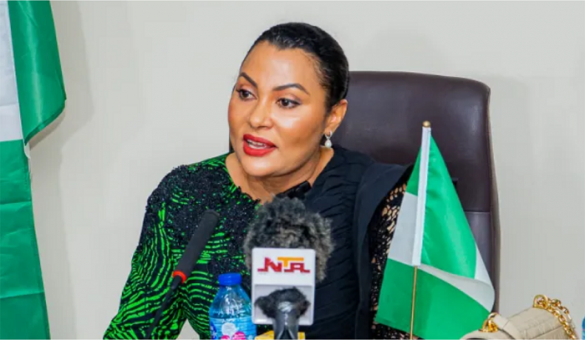By Segun Ayobolu
Her narrative of Nigeria, the country of her birth, is essentially a monotonous, one-track and static tale deliberately designed to further endear her to those who already have a jaundiced, perverse and derogatory perception of the capabilities of the black race and its claims to civilization and a shared equality of dignity with other races particular of the Caucasian variety. Mrs Kemi Badenoch has been especially voluble since her meterioc rise in British politics as leader of the Conservative Party and the opposition as regards the dysfunction, corruption, poverty and decadence that characterize contemporary Nigeria. It is difficult to fault her assertions that most Nigerian politicians are in public life for purposes of selfish aggrandizement than for the pursuit of the common good; that an institution like the Nigeria Police Force, for example, parades a good number of personnel who fall far short of the requisite professional and ethical standards or that essential facilities for a dignified life in a modern polity are inexcusably unavailable to the vast majority of the people.
That is the reality of the Nigeria Kemi grew up in as a child in the 1980s and from which she has escaped courtesy of her British citizenship by birth and is responsible for her decision to tenaciously cling on to her adopted country and aggressively seek to cut all physical, emotional and psychological ties with the land from which her parents and their ancestors sprang. The opportunities offered her by Britain not only to acquire qualitative education but to also ascend to the elite rungs of that country’s politics may seem to validate Kemi’s strident and unrestrained denunciations of Nigeria’s failings. It is doubtful if her obvious ability and brilliance would have been given such fertile soil to flourish in this country.
But there is also the danger that her negative narrative of Nigeria will help reinforce the prejudices of many of the far right white elements she seeks to court who may see her as another opportunistic black person from a failed country incapable of developing itself who has come to take advantage of a country built by the labour of others. It is impossible for Kemi to denigrate Nigeria in the way she is going about it without also devaluing her essence as a black person.
Many Nigerians have identified with and supported Kemi’s vehement criticisms of the country for essentially partisan reasons – their grievances against the outcome of the last presidential election and the resultant current political status quo in the country. Thus, the opposition has chosen to read her scathing comments as directed against President Bola Tinubu and the ruling All Progressives Congress (APC). Vice President Kashim Shettima’s take that she is free to drop her Nigerian name, Kemi, if she detests the country so much further spurred many in the opposition to rally to her defense.
Yet, the incidents that she cites to illustrate her negative depiction of Nigeria dates back to the late 1980s suggesting that the situation predates an administration that has been in office for less than two years since May 2023. Kemi’s criticisms, which cannot be dismissed as entirely baseless, thus constitute an indictment of the Nigerian political class as a whole across party demarcations as well as successive administrations in post-independence Nigeria.
I certainly do not agree with those who argue that patriotic love for country should restrain any citizen from publicly and unreservedly condemning Nigeria’s all too obvious failings. But the enterprise of such criticisms must be predicated on intellectual honesty and factual balance. Kemi’s lived experience of the Nigeria she paints in putrid colours to the world is of the Lagos of the 1980s and possibly early 1990s. Can it be empirically valid that Lagos, as an example, has remained static and unchanged since then? Has there been no improvement in infrastructural facilities since then? What about the light rail or Bus Rapid Transit system which now define the city’s landscape but was absent at the time Kemi references?
Before 1999, daylight Bank robberies were near daily occurrences in Lagos and armed robbers lay siege to estates and communities at night. Traffic and street lights were few and far between on Lagos roads; children carried chairs and benches to and from school daily while adults and children could be seen with all kinds of containers in search of water across the state. What about the mountains of refuse that defaced the state from Ikoyi to Ikorodu and Ikeja to Badagry?
Can Kemi and her supporters honestly say that there have been no positive developmental attainments from the situation nearly three and a half decades ago that informed the Conservative Party leader’s experience of Nigeria and now even if we admit that much more progress ought to have been made? In the same vein, is Mrs Badenoch right in depicting Britain as a model of perfection devoid of the kind of flaws such as pervasive corruption that taint Nigeria? The answer is an emphatic no.
Listen, for instance, to Carol Vorderman, the Welsh journalist, social critic and tv celebrity on the menace of corruption in the UK. Her words, “Yesterday, there was the Public Accounts Committee put out, and nobody’s reported it in mainstream media, that in the two years preceding Johnson becoming Prime Minister, there was an approximation of five and a half billion pounds of fraud and waste on government departments. In the following two years when Sunak was chancellor, that quadrupled to 21 billion pounds of fraud and it’s not being investigated. And this report said, not that mainstream media reported any of it at all, that of the 7.9 billion pounds that went into COVID testing, 6 billion pounds of that was given to the companies recommended by Tory MPs and ministers and peers. It goes on and on and it’s not being reported. I could go on for hours about the corruption”.
So much then for Mrs Badenock’s unceasing attempt to contrast an angelic Britain with an irredeemably demonic Nigeria. The reality may be far more complex than that and this is not in any way to suggest that the existence of corruption in Britain justifies its prevalence in Nigeria. But every community of flawed mortals has challenges with which it grapples not excluding the advanced western countries that she idolizes so uncritically. Indeed, the Conservative Party leader’s outlook may subconsciously be a function of the chronic inferiority complex arising from centuries of Nigeria and Africa’s encounter with slavery and colonial imperialism, which is a key factor in the continent’s protracted underdevelopment.
Yet, her analysis sees no linkage between about five centuries of slavery, colonial exploitation and neocolonialism and the wealth of the West in contrast to the poverty in Nigeria that she contemptuosly refers to.
Of course, this is not a line of argument worth pursuing too far as it gives the impression of seeking to find excuses for Africa’s indefensible dismal post colonial developmental performance. Nigerians have ruled Nigeria for six and a half decades since 1960 and must bear the responsibility for whatever they have made of their country. On that, Mrs Banedock cannot be faulted.
But then the disturbing poverty of historical consciousness in the Conservative Party leader’s analysis is evident in her response to Vice President Kashim Shettima’s jibe about her retaining a Nigerian Kemi identity of a country she so passionately detests.
In her words, “I find it interesting that everybody defines me as being Nigerian. I identity less with the country than with the specific ethnicity (Yoruba). That’s what I really am. I have nothing in common with the people from the north of the country, the Boko Haram where the Islamism is, those were our ethnic enemies and yet you end up being lumped with those people”. In the first place, she appears oblivious of the diverse multiethnic, multicultural and multi religious composition of the North. There are substantial numbers of Yoruba who have lived in the North from pre colonial times just as the Hausa-Fulani communities in many of the Southwest states date back to over two centuries ago.
Many states in the Northcentral and far North have considerable Christian populations just as Islam is deeply rooted in Yoruba land. Since precolonial times, there have been trade, marital, cultural and sometimes conflictual relationships between different primordial states and communities in the areas that today make up southern and northern Nigeria. And as Sam Omatseye pointed out in his column on Monday, the negative experiences she often narrates about Nigeria occured in Lagos in the Yoruba Southwest where she lived. When she talks about the north being “our ethnic enemies”, she is perhaps unaware of the protracted intra-Yoruba wars that lasted for over a hundred years before the colonial subjugation.
But then, in the final analysis, Mrs Badenoch is entitled to her worldview and the extreme conservative ideology she has opted to identify with. There is little that anybody can do about that. However, there is much that can be done about the undeniable dysfunction and poverty in Nigeria she describes and the corruption, ineptness and lack of vision of the political class responsible for this. Part of the missing link in her analysis and those of her supporters is that, despite its own shortcomings and the complex context in which it operates, the Tinubu administration is taking far reaching steps to address the root causes of the country’s debilitating challenges fundamentally.
The removal of the fuel subsidy that has saved humongous amounts of funds that has made it possible for most states to pay the new mininum wage of N70,000 with a number of states even exceeding this amount. The coming on stream of domestic crude oil refining through the new Dangote and rehabilitated Port Harcourt refineries, processes that had started under the preceding Buhari administration, and the envisaged ultimate mitigating impact on fuel prices. The merger of the parallel exchange rate markets and the elimination of the opportunities it provided for privileged and connected individuals to make instantaneous stupendous wealth without industry through arbitrage. The fiscal liberation of the local government councils from the financial asphyxiation of the states to promote the prospects of grassroots development.
The empowerment of states to generate and distribute electricity within their jurisdictions – an opportunity that a number of states are now taking advantage of with huge potential impact on the economy. The proposed thoroughgoing tax reforms which experts claim have revolutionary rejuvenating potentials for the Nigerian economy. These are a few of the key policy thrusts of the administration and they are beginning to bear tentative fruits. The country’s foreign reserves currently stands at about $42 billion, a considerable improvement. And the country recorded balance of trade surpluses of N6 trillion, N6.5 trillion and N6 trillion respectively over the last three quarters indicating steadily growing domestic productivity.
The fierce opposition in many quarters to the reforms despite the cautious and restrained approach of the administration shows just how difficult engineering change in a complex polity like Nigeria can be. But the challenge of critiques such as those posed by Kemi Badenoch is that there is no option but to deepen and sustain the reforms until the country is placed on an irreversible trajectory of growth, development and prosperity. This long term goal must be calibrated with urgent and effective short term measures to tame current astronomical inflationary spirals, drastically bring down food and transportation costs in particular and address the biting poverty that breeds citizen cynicism and generates support for extremist perspectives of the Kemi Badenoch variety. There must also be a more concerted effort to tackle the corrosive corruption at the root of high levels of inequality and deepens the high rate of poverty in a richly endowed country where the vast majority of the people have no business being poor.














